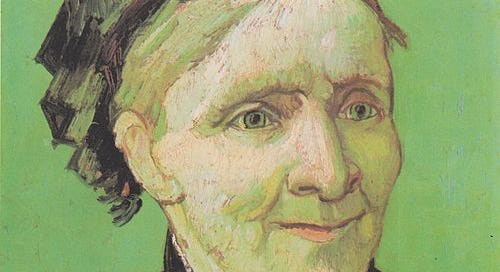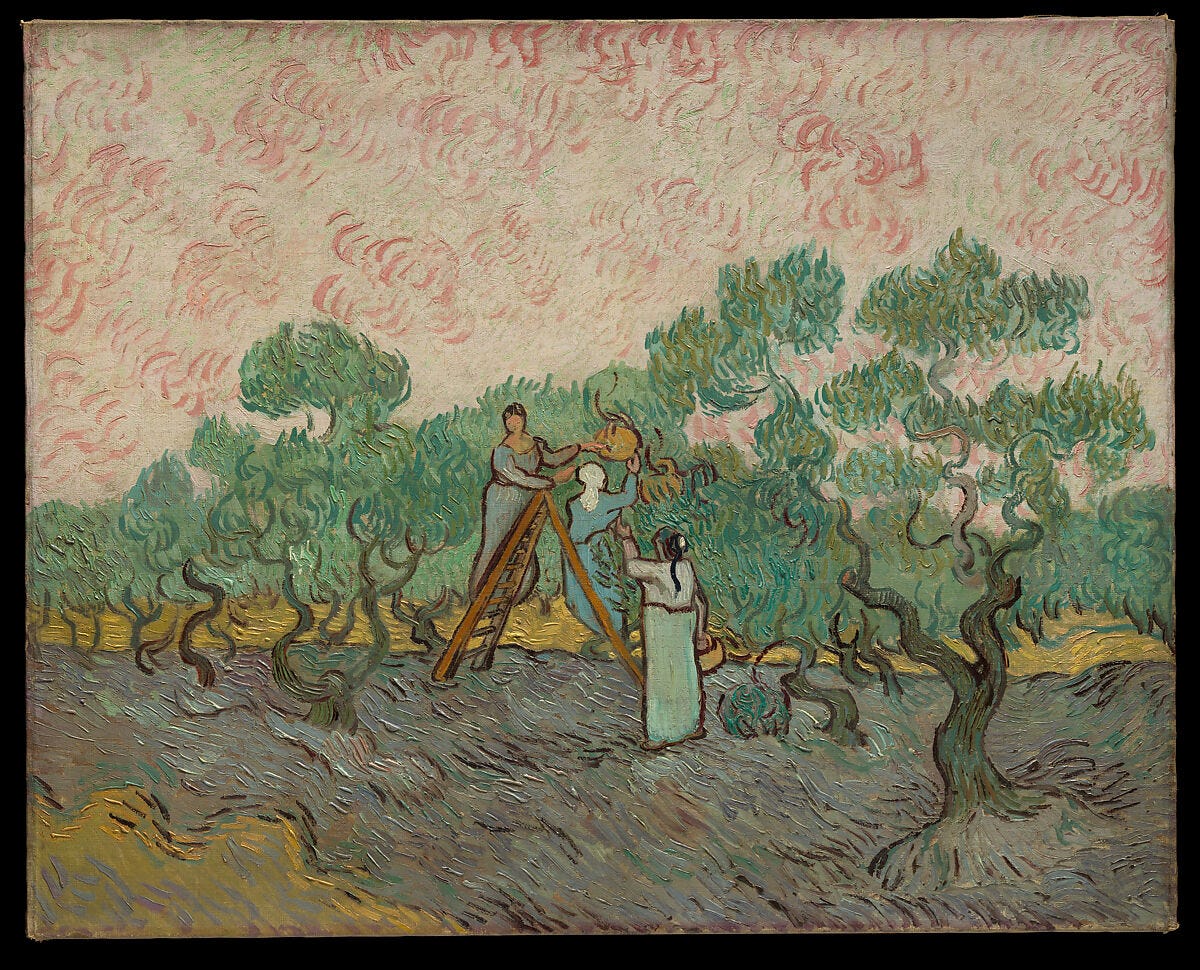Would Van Gogh have hated Mother's Day, too?
Part 3 in my obsessive deep dive into Vincent Van Gogh. Yes, it's still really all about me.
This is now Part 3 in my series in which I go deep into my total obsession with Vincent Van Gogh. Check out Part 1 and Part 2 at the links below. Am I done now, you might ask? Probably not. Turns out even the people who love you the most only have so much patience as you go on and on and fucking on about Van Gogh. So thanks for indulging me.
Van Gogh painted one portrait of his mother. It was from a photograph. At the time, Van Gogh hadn’t actually seen his mother in three years. He would never see her again before he died, two years later.
In the portrait, Anna Carbentus Van Gogh looks much happier than anything in Van Gogh’s biography would lead you to believe. Vincent was a constant disappointment to her. He was a consolation prize from the beginning, born on the exact same day as Anna’s first child, also a boy and also named Vincent, who was stillborn.
When Vincent was in the hospital in Arles for the first time after having cut off his own ear, Van Gogh’s mother wrote to Theo, Vincent’s brother, that she wished God would take Vincent. She was deeply religious so maybe this wish is more beneficent than it sounds. Or maybe, all in all, she wished her son would die. She wouldn’t be the first or the last mother to have such thoughts.
Van Gogh felt like an exile in his own family for most of his life. Various family members seemed agreed on the narrative that Vincent had driven his father to his death. Van Gogh left Paris and the apartment where he lived with his brother probably out of fear that the same thing would happen to Theo—that Vincent’s very presence would kill him.
Though Van Gogh was the oldest child, he was a perpetual disappointment to his parents and his siblings and his rich and successful uncles. Vincent didn’t dress right. He didn’t hang out with the right people. He couldn’t pick a suitable career and he couldn’t stick with the ones he did pick (except for artist, which he did stick with to the very end). He couldn’t support himself. He spent his whole life financially dependent on his brother, Theo, his reluctant ally.
It's not surprising, then, that Van Gogh spent a lot of time trying to create his own family. He strong-armed his brother into a relationship, though it’s clear Theo often felt ambivalent about his brother. He took up with several of his models and wanted to marry at least one. He courted women he barely knew, one of whom was already married. He wanted to build a community of artists who would become a new kind of family.
Van Gogh looked for family everywhere. He tried over and over again to build a new place for himself to belong. Over and over again, he failed. Sometimes while reading Van Gogh’s biography, I just wished someone would have got him a pet to take the edge off the man’s burning loneliness.
In the 1997 Ang Lee movie, The Ice Storm, the narrator describes family using the example of the Fantastic Four. “Family is like your own personal antimatter. Your family is the void you emerge from and the place you return to when you die. And that’s the paradox. The closer you’re drawn back in, the deeper into the void you go.”
In the memory of this quote I’ve been carrying around in my head for years, it reads differently. Family is both the source of your superpower and your own personal kryptonite. Family makes us who we are. Also, family is our biggest vulnerability. It is often the source of shame and fear and anxiety and great sadness. Like kryptonite, family renders us powerless. Family can destroy us in so many different ways.
I can’t know exactly what turned all of Van Gogh’s attempts at family into failures. Easy answers have their attractions. He had a form of epilepsy that made him mostly intolerable. Or he was on the autism spectrum. He had schizophrenia or Meniere’s disease or even sunstroke.
Or maybe like so many of us, his experience with family had made it hard to trust anyone enough to form a real relationship. Maybe he had such disturbed ideas of what love and caring looked like that he could not make it work. Who knows what went wrong. Who knows why he failed again and again.
We are social animals, as much as we like to tell ourselves that we’re not. If Van Gogh had found some form of family, would he have lost the great art that eventually exploded from his brush? Or would the art have been even better? Even more amazing? Even more prolific?
There are many times that, like Van Gogh, I’ve craved that community of fellow artists. It’s a utopian vision, I guess. The idea of a bunch of often moody and temperamental people living together. Could that really work? But it also has its appeal. I can see the attraction of being with people for whom so much about life as an artist does not need to be explained.
Like Van Gogh, the idea of that community both attracts and repels. Would I enjoy hanging out with other writers as much as I think I would? Wouldn’t we get on each other’s nerves? How do you avoid the competition and jealousy? Community, like family, is so much harder in the reality than it is when you’re imagining it in your head.
I am a huge fan of brunch, but I really hate Mother’s Day. There are a lot of reasons behind that dislike, but one of them is probably the compulsion of it all. It’s what I dislike about so many holidays. I’m a contrary person and I don’t like being told what to do or think or feel on a certain day. I mean, I love brunch, but who the fuck wants to deal with the shitshow that is going out for brunch on Mother’s Day?
Holidays tell you want you’re supposed to do and also what you’re supposed to feel. But one thing I know for sure is that people have a lot of complicated feelings about their mothers. And mothers have a lot of complicated feelings about their kids. And everyone has a lot of complicated feelings about motherhood in general. It’s impossible for one day to make enough room for all those feelings. I’m not even sure a year would be enough.
Van Gogh’s mother was a decent watercolorist. This wasn’t that unusual for women of her time period and nationality and social class. It did not in the least mean that she was happy when Vincent became an artist. It does not mean she ever encouraged him in his art in the least.
Vincent tried to paint things that he thought his mother and the rest of his family would like. Flowers. Landscapes. Women picking olives. Memories of the house where they’d grown up. When he sent his family these paintings, the response was tepid at best. After all, even Van Gogh’s flower paintings would have looked weird to his mother.
If I could give my daughter one gift on Mother’s Day, I would give her the firm knowledge that she is not responsible for my happiness. She’s not responsible for anyone’s happiness but her own. I would want her to know that her life belongs to her and her alone. Period. Her life is hers to do whatever she wants with and I’m a spectator. A cheerleader, at most.
If I could give my daughter one gift, it would be the freedom from ever worrying about pleasing me. I’m also not sure that’s a gift any parent can give their child.
I wish Van Gogh’s mother would have tried to give him that gift. I wish it were something more parents aspired to give their kids.














I had no idea Van Gogh had such a rough life.
Looking forward to it. I'm a fan, too.